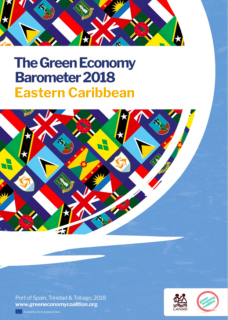
The Eastern Caribbean Green Economy Barometer 2018 provides a snapshot of the transition to an inclusive green economy. This report focuses on the varied greening experiences of the Organization of Eastern Caribbean States (OECS) members, the conception of GE, and the successes and failures of OECS members to implement GE-informed policies.
This report is focused on countries belonging to the Organization of Eastern Caribbean States (OECS) that aims to increase the understanding of how the Green Economy (GE) operates in the Caribbean context. The findings of this report are based on questionnaire responses by OECS government officials and civil society, consultation with the OECS Commission, the input of the stakeholders attending two webinars, and the authors' own desk research. The findings claim that the overall status of the transition to a fair green economy in the Eastern Caribbean is below average as the definition of the GE used are narrow with almost no consideration of equity and inclusion. The environmental limits are being considered by governments for adoption as policy, but there are still very few legislative proposals for policies in national GE priority sectors and the role of small and medium-sized enterprises (SMEs) and informal actors, not factored into official approaches. While there are substantial interests and indicators of commitment to greening the sub-region, there is little evidence of real economic transformation or mainstreaming of the GE concept.
